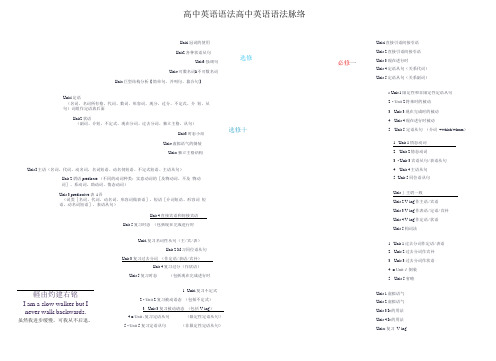2019人教版高中英语必修一Unit4 话题词汇思维导图
- 格式:doc
- 大小:445.00 KB
- 文档页数:12


句子成分和基本句型句子成分主语表示句子所要说明或描述的人或事物,一般为名词(短语)、代词、数词、动名词(短语)、不定式(短语)或从句,位于句首谓语说明或描述主语的动作、状态或特征,由动词或动词短语充当,位于主语之后宾语指动作所涉及的人或事物,一般由名词、代词或相当于名词的词组或句子充当,位于动词之后直接宾语表示动作的承受者,一般是物间接宾语指动作是对谁做的,一般是人表语表示主语的身份、性质、状态和特征,一般由名词、形容词或相当于名词、形容词的词、短语或句子充当,位于连系动词之后宾语补足语用来对宾语进行补充和说明,一般由名词、非谓语动词、形容词等充当定语修饰名词或代词的词、短语或从句,多放在被修饰部分的前面,但由多个词构成的定语则通常放在被修饰部分的后面状语用于修饰动词、形容词、副词、短语或整个句子等,一般由副词、介词短语、非谓语动词短语或句子充当同位语通常在名词或代词之后,与其并列并对其加以说明基本句型主+谓(S+V)主+系+表(S+P)主要用来表示主语的特点、身份等。
其系动词一般可分为表状态和表动作两类主+谓+宾(S+V+O)主+谓+间宾+直宾(S+V+IO+DO)直接宾语为主要宾语,表示动作是对谁做的或为谁做的,在句中不可或缺,常常由表示“物”的名词来充当;间接宾语也被称之为第二宾语,去掉之后,对整个句子的影响不大,多由指“人”的名词或代词充当主+谓+宾+宾补(S+V+O+C)句子谓语为及物动词,有时只跟一个宾语不能表达完整意思,需要用宾语补足语对宾语进行补充说明主+谓+状(S+V+A)句子谓语为不及物动词,需要加状语对谓语动词进行补充说明或限定主+谓+宾+状(S+V+O+A)句子谓语为及物动词,跟宾语后句意还不完整,需要加状语进行补充说明或限定T here be... 句型此句型是由there +be+主语+状语构成,用以表达存在。
它其实是倒装的一种情况,主语位于谓语动词be之后,there仅为引导词,并无实际意义。







高中英语语法高中英语语法脉络Uniti冠词的使用Unit2各种状语从句Unit3强调句Unit4可数名词&不可数名词选修必修一Unit5巨型结构分析【简单句、并列句、篡合句】Uniti直接引语间接引语Unit 2直接引语间接引语Unit 3现在进行时Unit 4定语从句(关系代词)Unit 5定语从句(关系副词)Uniti定语(名词、名词所有格、代词、数词、形容词、现分、过分、不定式、介短、从句)词组作定语放后面Unit2状语(副词、介短、不定式、现在分词、过去分词、独立主格、从句)Unit3时态小结选修十s Unit 1限定性和非限定性定语从句2• Unit 2将来时的被动3. Unit 3现在完成时的被动4. Unit 4现在进行时被动5- Unit 5 定语从句(介词+which/whom)Unit4虚拟语气的倒装Units独立主格结构Unit I主语(名词、代词、动名词,名词短语、动名伺短语、不定式短语、主语从句)Unit 2谓语predicate (不同的动词种类:实意动词的[及物动词、不及物动词]、系动词、助动词、情态动词)1. Unit 1情态动词2. Unit 2情态动词3• Unit 3宾语从句/表语从句4. Unit 4主语从句5- Unit 5同位语从句Unit 3 predicative表i吾(词类[名词、代词、动名词、形容词做表语]、短语[介词短语、形容词短语、动名词短语]、表语从句)--- -----------------------Unit 4直接宾语和间接宾语Unit 5复习时态(包括现在完成进行时Unit ]主谓一致Unit 2 V-ing作主语/宾语Unit 3 V-ing作表语/定语/宾补Unit 4 V-ing作定语/状语Unit 5构词法Uniti复习名词性从句(主/宾/表)Unit 2 M习同位语从句Unit 3复习过去分词(作定语/表语/宾补)Unit 4复习过分(作状语)Unit 5复习时态(包括现在完成进行时1. Unit 1过去分词作定语/表语2. Unit 2过去分词作宾补3. Unit 3过去分词作状语4■ Unit 4倒装5- Unit 5 省略軽由灼建右铭I am a slow walker but I never walk backwards. 虽然我进步缓慢,可我从不后退。

Unit4 Listening and Speaking and Reading 长难句型精析1.现在分词作伴随状语现在分词作伴随状语时,表示的动作和句子的谓语动词表示的动作同时发生。
可位于句首、句中或句末。
教材原文Mice ran out of the fields looking for places to hide, and fish jumped out of the water.老鼠从田地里跑出来找地方藏身,鱼从水里跳出来。
结构剖析本句是一个并列复合句,第一个分句中现在分词短语looking for places to hide 作伴随状语,其动作与该分句中谓语动词表示的动作同时发生。
经典例句①She often sits by the window,thinking back to the good old days.她经常坐在窗户旁边,回想美好的旧日的时光。
②Do you wake up every morning feeling energetic?你每天早上醒来觉得精力充沛吗?③When I was little, my mother used to sit by my bed, telling me stories till I fell asleep.我小的时候,母亲常常坐在我床边给我讲故事,直到我睡着为止。
应用佳句There is no greater pleasure than lying on my back in the middle of the grassland, staring at the night sky.没有比仰面躺在草地中央凝视着夜空更惬意的事情了。
2. as if引导的从句(1) as if “好像,仿佛”,相当于as though,常用在be, look,seem,sound, taste, feel等系动词后引导表语从句。
(2)as if/as though还可引导方式状语从句。
(3)as if/as though引导的从句如果与真实情况相差甚远或相反时,从句用虚拟语气。
(4) as if引导的方式状语从句的省略结构:当从句主语与主句主语相同或从句主语为it,且从句中含有be动词时,从句中的主语和be 动词可省略。
教材原文It seemed as if the world were coming to an end!仿佛到了世界末日!结构剖析本句是主从复合句,其中as if引导表语从句,从句使用了虚拟语气。
经典例句①It looks as if it is going to rain.看起来好像要下雨了。
②Jack wasn’t saying anything, but the teacher smiled at him as if he had done something right.杰克没说什么,但是老师向他微笑,好像他做了什么对的事情。
③Keep your cell phone silent as if you were listening to a lecture and exit the library if you need to receive calls.使你的手机保持静音,就好像你在听讲座,如果需要接电话就离开图书馆。
(as if引导方式状语从句,从句中用了虚拟语气)④Tom raised his hand as if to say something.汤姆举起手好像要说什么。
(as if后面省略了he was)应用佳句(2017 北京,七选五)It’s as if the brain is preserving its most important memories.好像大脑在保护它最重要的记忆。
3. everywhere引导的状语从句everywhere = everyplace,用作连词,可以引导地点状语从句。
everywhere 还可以用作副词,表示“到处,各处”。
be everywhere表示“非常普遍,到处都是”。
引导地点状语从句的词还有where、wherever等。
教材原文Everywhere survivors looked, there was nothing but ruins.幸存者们目及之处只有废墟。
结构剖析Everywhere引导地点状语从句,主句是there be句型。
经典例句①Everywhere he goes, he will not forget the terrible experience.他走到哪儿也忘不了那次可怕的经历。
②Plants u sually grow well where there is plenty of sunshine and water.在阳光和水分充足的地方植物通常长得好。
③Some people enjoy themselves wherever they are.有些人在任何地方都能过得快活。
应用佳句(2018 北京,阅读理解D) It’s hard to predict when driverless cars will he everywhere on our roads.难以预测无人驾驶汽车何时会在我们的道路上到处都是。
4.主语+be+adj.+to do 句型在该句型中常常使用不定式的主动形式表示被动意义。
使用此结构需具备两个前提条件:(1)形容词常常说明不定式的特征。
常见的此类形容词有difficult, hard, easy, good, comfortable, pleasant, interesting, dangerous 等。
(2)句子的主语是不定式的逻辑宾语。
同时,使用此结构时需注意两点:(1)若不定式中的动词为不及物动词,其后应该加相应的介词。
(2)不定式有时会带着自己的逻辑主语,常用for引出。
教材原文Water, food, and electricity were hard to get.水、食物和电都难以获得。
结构剖析本句是“主语+be+形容词+to do”句型。
to get是不定式的主动形式表示被动含义。
经典例句①This machine is very easy to operate. Anybody can learn to use it in a few minutes.这台机器很容易操作。
任何人在几分钟内都能学会使用它。
②The morning air in summer is so good to breathe.夏天早上的空气呼吸起来非常好。
③The armchair looks rather hard, but it is very comfortable to sit in.这把扶手椅看上去很硬,但坐上去很舒服。
(sit在句中表示“坐”,为不及物动词,故其后应加相应的介词)应用佳句(2019北京,阅读理解C)Credibility is hard to earn but easy to lose,and the problem is only going to get harder from here on out.信用难以获得却容易失去,并且这个问题从现在开始只会更加难以解决。
5.“leave+宾语+宾语补足语”结构此结构是leave加复合宾语的形式,此结构中的宾补可由名词、形容词、副词、现在分词、过去分词或介词短语等充当。
教材原文The huge earthquake left nearly the whole city in ruins.大地震几乎使整个城市成为废墟。
结构剖析本句中含有“leave—宾语+宾语补足语”结构,in ruins是介词短语,表示nearly the whole city 所处的状态。
经典例句①The earthquake left him an orphan.地震使他成了孤儿。
②He went to bed, leaving the television on.他开着电视上床睡觉了。
③You’d b etter leave her alone. She’s very annoyed now.你最好不要打扰她,她现在很生气。
④Don’t kuve the water running while you brush your teeth.当你刷牙时,不要让水一直流。
⑤Don,t leave your work hall done.不要让你的工作半途而废。
应用佳句(2017 课标II,七选五)Leave it open when you’re available to talk and close it when you’re not.当你有空说话的时候就让它开着,当你没空说话的时候就把它关上。
6. as…as…和.教材原文Soldiers and volunteers worked as hard as they could to pull away bricks and rocks, and rescue those who were trapped under the ruins.士兵和志愿者们尽最大努力把砖和石头挪走,并营救被困在废墟下面的人。
结构剖析本句运用了“as+副词原级+as”结构,不定式短语作目的状语。
经典例句①The exam is as easy as the last one.这次考试和上次一样容易。
②Tom works as hard as Mary.汤姆和玛丽工作一样努力。
③He has as big a house as mine.他有一座和我的一样大的房子。
④He made as many mistakes as I did.他犯的错误和我犯的一样多。
应用佳句(2017课标Ⅱ,阅读理解B)When the studio didn’t want me for the film-it wanted somebody as well known as Paul-he stood up for me.当电影公司不想让我演这部电影—它想要一个像保罗一样出名的人的时候——他支持我。
即时训练:完成句子1.他坐在那儿,看着一份报纸。
He sat there, .2.他整夜都没有入睡,思索着这个问题。
All night long he lay awake, .3.他站在门旁边,一句话也不敢说。
He stood by the door, a word.单句填空4.When the clerk saw a kind face with an apologetic smile,she stood there, (wonder) whether to stay or to leave.5.“Where have you been? We thought that you were lost!”Mother said angrily (point) to Lily.6. (sing) a pop song in a low voice,he walked into the yard.单句填空7.—Where is the noise from?—It sounds as if it (come) from the upstairs.8.Don’t handle the vase as if it(be) made of steel.9.It was John who broke the window. Why are you talking to me as if I (do)it?10.When a pencil is partly in a glass of water, it looks as if it (break).11.I remember the whole thing as though it (happen) yesterday.12.She talks as if she herself ( be ) an expert.13.School started,but I ( feel) more and more as if I were in a foreign country.14.He talked if he had known what had happened.15.It (sound) as if he is getting worse.16.It sounds as if he .17. She smiled at me as if my mind. 完成句子18.听起来他好像试图要说些什么。